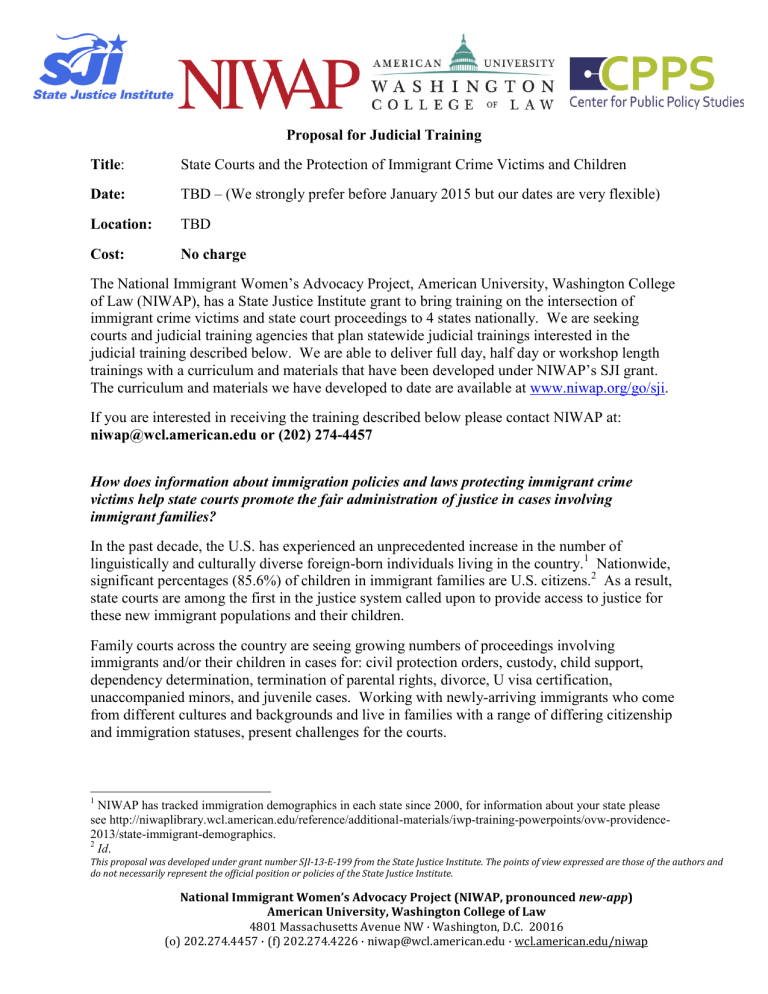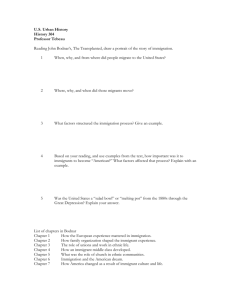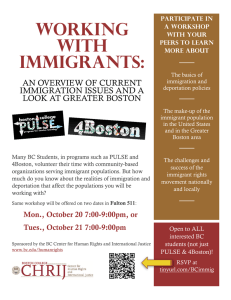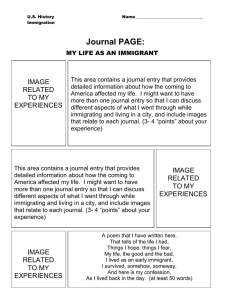SJI Full Proposal for Judicial Training

Title :
Date:
Proposal for Judicial Training
State Courts and the Protection of Immigrant Crime Victims and Children
TBD – (We strongly prefer before January 2015 but our dates are very flexible)
Location: TBD
Cost: No charge
The National Immigrant Women’s Advocacy Project, American University, Washington College of Law (NIWAP), has a State Justice Institute grant to bring training on the intersection of immigrant crime victims and state court proceedings to 4 states nationally. We are seeking courts and judicial training agencies that plan statewide judicial trainings interested in the judicial training described below. We are able to deliver full day, half day or workshop length trainings with a curriculum and materials that have been developed under NIWAP’s SJI grant.
The curriculum and materials we have developed to date are available at www.niwap.org/go/sji .
If you are interested in receiving the training described below please contact NIWAP at: niwap@wcl.american.edu or (202) 274-4457
How does information about immigration policies and laws protecting immigrant crime victims help state courts promote the fair administration of justice in cases involving immigrant families?
In the past decade, the U.S. has experienced an unprecedented increase in the number of linguistically and culturally diverse foreign-born individuals living in the country.
1
Nationwide, significant percentages (85.6%) of children in immigrant families are U.S. citizens.
2
As a result, state courts are among the first in the justice system called upon to provide access to justice for these new immigrant populations and their children.
Family courts across the country are seeing growing numbers of proceedings involving immigrants and/or their children in cases for: civil protection orders, custody, child support, dependency determination, termination of parental rights, divorce, U visa certification, unaccompanied minors, and juvenile cases. Working with newly-arriving immigrants who come from different cultures and backgrounds and live in families with a range of differing citizenship and immigration statuses, present challenges for the courts.
1
NIWAP has tracked immigration demographics in each state since 2000, for information about your state please see http://niwaplibrary.wcl.american.edu/reference/additional-materials/iwp-training-powerpoints/ovw-providence-
2013/state-immigrant-demographics.
2 Id .
This proposal was developed under grant number SJI-13-E-199 from the State Justice Institute. The points of view expressed are those of the authors and do not necessarily represent the official position or policies of the State Justice Institute.
National Immigrant Women’s Advocacy Project (NIWAP, pronounced new-app )
American University, Washington College of Law
4801 Massachusetts Avenue NW · Washington, D.C. 20016
(o) 202.274.4457 · (f) 202.274.4226 · niwap@wcl.american.edu · wcl.american.edu/niwap
A review of family court decisions reveals a growing number of cases in which court rulings have been based on legally incorrect information about U.S. immigration laws and/or about the immigration laws’ applicability to a party or a witness in the case. Access to legally accurate information about immigration laws, DHS regulations, policies, and current DHS priorities and practices will promote the fair administration of justice in cases involving immigrant families.
This includes information about immigration protections for immigrant victims of domestic violence, child and elder abuse, sexual assault, and human trafficking under the Violence Against
Women Act (VAWA) and the Trafficking Victims Protection Act (TVPA) that have been an essential part of U.S. immigration laws for almost two decades.
What is the training that NIWAP will offer?
The National Immigrant Women’s Advocacy Project (NIWAP), American University
Washington College of Law is working with the Center for Public Policy Studies (CPPS),
Immigration and the State Courts Initiative, and Human Trafficking and the State Courts under a grant from the State Justice Institute, U.S. Department of Justice. This grant funds the development of a training workshop for judges on issues that arise in state court cases involving immigrant parties and immigrant families. NIWAP would like to offer a training for state court judges in your state. The trainings we offer include: plenary sessions for state-wide judicial trainings; workshops for state-wide judicial trainings; ½ day or full day training for judges and court staff that could include training for a mixed audience of judges, police, prosecutors, attorneys and victim advocates. Faculty for the training will include Leslye E. Orloff, NIWAP’s
Director, John Martin of CPPS, and a state court judge who is an expertise in family law, immigration benefits, U visa certification and the judicial process, and a family court judge
(either the Honorable Lora Livingston or the Honorable Ramona Gonzalez).
The training will provide judges with tools, bench cards, and materials containing up-to-date, legally correct information on current DHS policies, immigration enforcement priorities, and immigration law options that provide protection from deportation, legal immigration status and work authorization for immigrant victims of domestic violence, child abuse, elder abuse, sexual assault, stalking, human trafficking and other crimes. NIWAP’s collection of SJI-approved tools for state courts on immigration relief for immigrant crime victims and children
3
may be accessed here: www.niwap.org/go/sji . This information, together with the individual technical assistance
NIWAP offers judges, will provide judges the information they need for the fair administration of justice in cases involving immigrant litigants and immigrant crime victims.
How will NIWAP’s proposed judicial training help state court judges and court staff?
Having a better understanding of the unique dynamics of violence and sexual assault perpetrated against immigrant victims will help courts recognize patterns, access lethality and issue effective court orders in cases involving immigrants and their children. The fair administration of justice is promoted when courts have access to legally accurate information on the full range of legal options, government funded services and public benefits available to immigrants from state and federal governments. The training will provide an overview of legal options for immigrant crime
3 The materials include bench cards, charts, and other tools to assist courts and judges in cases involving immigrant parties, victims and witnesses. The development of this section of the web library was developed under grant number SJI-12-E-169 from the State Justice Institute. The points of view expressed are those of the authors and do not necessarily represent the official position or policies of the State Justice Institute.
American University, Washington College of Law 2
victims including: immigration relief (e.g. VAWA self-petition, VAWA confidentiality rules, U and T visas, special immigrant juvenile status, and protection from deportation), public benefits
(e.g. health care, housing, food stamps, victim assistance, and income support), language access, and the effect of immigration laws on state family and criminal court cases. The training will highlight how these legal issues arise in family court proceedings, particularly in custody, protection orders, and child support cases involving immigrant family violence, sexual assault and human trafficking victims. The special role Congress created for judges in issuing U visa certifications will also be discussed.
Learning Objectives
Understand the intersections between state court proceedings and immigration law
Know how accurate immigration law information affects just and fair outcomes in state courts
Recognize facts that indicate a party qualifies for legal immigration status and/or protection from deportation and which immigrants are a low priority for removal
Be able to sign U visa certifications
Make findings in state court cases that are helpful to an immigrant crime victim’s immigration case
Faculty Bios
LESLYE E. ORLOFF is an Adjunct Professor and the Director of the National Immigrant
Women’s Advocacy Project (NIWAP) at American University Washington College of Law, which advocates for laws, policies and practices that enhance legal options for immigrant women and immigrant victims of domestic violence, sexual assault and human trafficking. She founded and directed the Immigrant Women Program at Legal Momentum (1999-2011) and the National
Network to End Violence Against Immigrant Women (1992-2011). NIWAP provides technical assistance, training and advocacy designed to improve access to immigration benefits, the justice system, public benefits, social services and health care.
Leslye was a co-founder and co-chair of the National Network to End Violence Against
Immigrant Women and was the Washington, D.C. spokesperson for that organization from 1992 to 2011. In that capacity she was involved in drafting the Protection for Immigrant Victims of
Violence Against Women in the Violence Against Women Acts of 1994, 2000, 2005 and 2013.
Additionally, Leslye helped draft the Trafficking Victims Protection Acts of 2000 and 2008, legal services access for battered immigrants in 1997 and 2005 and welfare access for battered immigrants in 1996.
Leslye has written local and national training curricula, manuals, and story collections bringing immigrant women’s voices to national policy makers. She is a nationally respected trainer of attorneys, victim advocates, police, judges, women’s programs, women executives and health professionals on leadership, public policy advocacy, domestic violence, cultural competency, family law, protection orders, the Violence Against Women's Act's immigration provisions, welfare rights of women immigrant crime victims, the nexus between violence against women
American University, Washington College of Law 3
and immigration law and the how each of us can become involved locally and/or nationally in making a real difference in the world.
During Leslye’s 17-year litigation career prior to joining Legal Momentum, she founded and directed the domestic violence program at Ayuda, a legal services agency that served the interrelated legal and social service needs of battered immigrant women and children. She has also published numerous social science journal and law review articles on women’s experiences with domestic violence, sexual assault and immigration and immigrant victims' legal rights.
Leslye's work on behalf of immigrant women has received national recognition, including the
2012 Daynard Public Interest Fellowship, Northeastern University Law School, the 2007 Sheila
Wellstone Award awarded to the National Network to End Violence Against Immigrant Women, the 2007 Annual Rosalynn B. Bell Award, presented to Leslye by the Women’s Law Center of
Maryland for her contributions to the field of family law, a Kellogg National Leadership
Fellowship in 1994 and a Harvard Law School Wasserstein Public Interest Law Fellowship in
2002.
Leslye received her J.D. from the University of California at Los Angeles, and graduated magna cum laude with a B.A. from Brandeis University.
JOHN A. MARTIN, Ph.D. is the Director of the Center for Public Policy Services Immigration and the State Courts Initiative. Dr. Martin, a planning, policy, and management consultant, is recognized as an innovator in planning, management, performance measurement, and institutional development for justice and human service organizations. Over the past 36 years, he has worked with courts, justice, and human service agencies of all types. Dr. Martin received a
Ph.D. from the Graduate School of Public Affairs of the University of Colorado, an M.A. in
Political Science, University of Colorado, a B.A. in Political Science from Fort Lewis College,
Durango, Colorado, and has had extensive mediation training from CDR Associates.
HONORABLE LORA LIVINGSTON is a 1982 graduate of the UCLA School of Law. She began her legal career as a Reginald Heber Smith Community Lawyer Fellow assigned to the
Legal Aid Society of Central Texas in Austin, Texas. After completion of the two-year fellowship program, Judge Livingston continued to work in the area of poverty law until 1988 when she entered private practice with the law firm of Joel B. Bennett, P.C. In 1993, she and S.
Gail Parr formed a partnership and opened the law firm of Livingston & Parr. She was engaged in a general civil litigation practice with an emphasis on family law. In January, 1995, she was sworn in as an Associate Judge for the District Courts of Travis County, Texas. After her successful election, Judge Livingston was sworn in as Judge of the 261st District Court in
January, 1999. She is the first African-American woman to serve on a district court in Travis
County, Texas. At the August 30, 2011, meeting of the civil and criminal district judges, the
Honorable Lora J. Livingston was unanimously elected as the new Travis County Local
Administrative Judge effective September 2011.
Judge Livingston has been active in local, state and national bar association activities and has served on the boards of the Texas Equal Access to Justice Foundation, Texas Access to Justice
Commission, the National Center on Women and Family Law, the National Association of
American University, Washington College of Law 4
IOLTA Programs, the Judicial Section of the State Bar of Texas and the Board of Directors of the Texas Center for the Judiciary. She is a member of the National Bar Association and the
National Association of Women Judges and the Judicial Division of the American Bar
Association (ABA). She is a delegate to the ABA House of Delegates and she is the chair of the
ABA Commission on interest of Lawyers Trust Accounts (IOLTA). She has also served on a number of committees in various local bar associations, including the Austin Bar Association, the Austin Black Lawyers Association and the Travis County Women Lawyers Association. She is also an advocate of pro bono activities and she has served on the Board of Volunteer Legal
Services (formerly Austin Lawyers Care).
In 1992, she received the “Outstanding Attorney” award from the Travis County Women
Lawyers Association. In 2005, she received both the Texas Access to Justice Commission Pro
Bono Champion Award and the Texas Equal Access to Justice Foundation Harold F. Kleinman
Award. Judge Livingston has twice received the Texas Center for the Judiciary Exemplary
Judicial Faculty Award, once in 2005-2006 and again in 2008-2009. She was also awarded the
Women of Distinction Award in 2006 by the Lonestar Girl Scouts Council and the Community
Service Award in 2007 by the Austin Independent School District.
An active member of the Austin community, Judge Livingston has served on the boards of the
Ann Richards School for Young Women Leaders, Capital Area Food Bank, Austin Symphony
Orchestra, Austin Tenants Council, Central East Austin Community Organization, YMCA,
Austin Area Urban League, and El Buen Samaritano. Judge Livingston is also a graduate of the
1999-2000 class of Leadership Austin.
HONORABLE RAMONA GONZALEZ earned her law degree from Marquette Law School in
1981. From 1982-1995, Judge Gonzalez served as the judicial court commissioner to La Crosse
County Circuit Judge, Peter G. Pappas. Judge Gonzalez has been serving as a State of
Wisconsin Circuit Judge since April 1995. Prior to her judgeship, she was an attorney at
Bosshard & Associates in La Crosse, Wisconsin for nine years. She focused on family law, probate, civil litigation, and appeals.
She has served as a member of both the Judicial Education Committee and the Commission on
Judicial Elections and Ethics. She is a past associate dean of the Judicial College of Wisconsin where she taught criminal sentencing. Judge Gonzalez has conducted trainings for the National
Council of Juvenile and Family Court Judges, the National Judicial Institute on Domestic
Violence, the Hague Private Conference on Civil Child Abductions, and the Wisconsin Judicial
College. She has served on the Family Violence Department Advisory Committee for NCJFCJ, and has been an active speaker and trainer for numerous organizations, including the NCJFCJ.
She has participated in or presented during numerous international conferences and meetings, and serves as Liaison Judge with the U.S. Judicial Advisory Council on International Family
Abduction. Among her many awards and honors, Judge Gonzalez has received the President
Award from the State Bar of Wisconsin
.
American University, Washington College of Law 5




